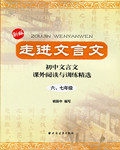题目内容
Mo Yan, a famous Chinese writer, won the Nobel Prize for literature at the end of the year 2012.We learn that success the person with a never-give-up attitude.
A. turns to B. takes apart C. belongs to D. devotes to
【答案】
C
【解析】
试题分析:短语turn to转向,向…求助;take apart拆开,拆卸;belong to属于;devote to致力于..,把…用于…;句义:莫言,一位中国的作家,在2012年底的时候赢得了诺贝尔文学奖。我们知道他的成功属于一个拥有永不放弃的精神的人。根据句义可知C项符合上下文的动宾及词义辨析。
考点:考察动词短语辨析

练习册系列答案
 字词句篇与同步作文达标系列答案
字词句篇与同步作文达标系列答案 走进文言文系列答案
走进文言文系列答案
相关题目
The Nobel Prize for Literature was _______ awarded to a Chinese writer, Mo Yan.
| A.the first time | B.for the first time | C.on the first time | D.the only time |